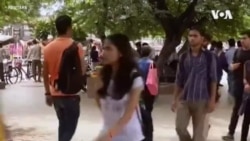ນັກວິທະຍາສາດຄອມພິວເຕີສອງຄົນຂອງມະຫາວິທະຍາໄລລັດແມຣີແລນ ໄດ້ພັດທະນາລະບົບປັນຍາປະດິດ ຫລື AI ຊະນິດໃຫມ່ທີ່ມີວິວັດທະນາການເພື່ອກວດຫາ ແລະ ຫລີກລ້ຽງການສິ້ງຊອມຕິດຕາມທາງອິນເຕີແນັດໃນບັນດາປະເທດທີ່ມີການຄວບຄຸມຢ່າງເຄັ່ງຄັດ. Julie Taboh ນັກຂ່າວວີໂອເອມີລາຍງານເພີ່ມເຕີມ ຊຶ່ງ ບົວສະຫວັນ ຈະນຳມາສະເໜີທ່ານໃນອັນດັບຕໍ່ໄປ.
ລັດຖະບານທີ່ມີການຄວບຄຸມຢ່າງເຄັ່ງຄັດໃນທົ່ວໂລກໄດ້ຕິດຕາມກວດກາ ແລະຄວບຄຸມເບິ່ງການສື່ສານທາງອິນເຕີແນັດທີ່ພົນລະເມືອງຂອງເຂົາເຈົ້າສົ່ງ ແລະຮັບ.
ການພະຍາຍາມຫຼີກລ້ຽງການຖືກສິ້ງຊອມຕິດຕາມ ຫລືເຊັນເຊີເຊັ່ນນັ້ນ ເປັນ ຂະບວນການທີ່ຊັກຊ້າ ແລະຫຍຸ້ງຍາກຫລາຍ. ພວກນັກຄົ້ນຄວ້າມັກຈະຕ້ອງ ໄດ້ຊອກຫາວິທີທາງຫລີກລ້ຽງມັນດ້ວຍການໃຊ້ມືເຮັດ.
ທ່ານ ເດັບ ເລວິນ (Dave Levin) ກ່າວວ່າ: "ດຽວນີ້ພວກເຮົາເຂົ້າໃຈວ່າປະເທດຕ່າງໆເຫຼົ່ານັ້ນ ຈະໃຊ້ອຸປະກອນທີ່ແຕກຕ່າງກັນປະສົມປະສານເຂົ້າກັນ... "
ແຕ່ນັກວິທະຍາສາດຄອມພິວເຕີຢູ່ມະຫາວິທະຍາໄລລັດແມຣີແລນ ໄດ້ພັດ ທະນາຊອຟແວປັນຍາປະດິດ ຫລື AI … ທີ່ເອີ້ນວ່າເຈເນວາ (Geneva), ເຊິ່ງຮຽນຮູ້ວ່າເທັກໂນໂລຈີໃນການສິ້ງຊອມຕິດຕາມຖືກນຳໃຊ້ແນວໃດ ແລະກໍ ປັບຕົວຕະຫລອດເວລາເພື່ອຫລີກລ້ຽງມັນໃຫ້ໄດ້.
ທ່ານ ເດັບ ເລວິນ ຈາກມະຫາວິທະຍາໄລລັດແມຣີແລນກ່າວອີກວ່າ:
"ຂ້າພະເຈົ້າຄິດວ່າ ເຈນີວາ ປ່ຽນແປງການໄລ່ຕາມກັນແບບນີ້, ເພາະວ່າໃນທີ່ສຸດ ມັນກໍຈະເຮັດໃຫ້ຜູ້ຫລົບຫນີມີປະຕິກິລິຍາຕອບໂຕ້ໄດ້ຢ່າງວ່ອງໄວຫລາຍ ຕໍ່ການປ່ຽນແປງໃນການສິ້ງຊອມ ຫລື ເຊັນເຊີ."
ຂໍ້ມູນກ່ຽວກັບອິນເຕີແນັດໄດ້ຖືກແຍກອອກເປັນຊຸດຂໍ້ມູນໂດຍຄອມພິວເຕີຂອງຜູ້ສົ່ງ ແລະປະກອບຄືນໃຫມ່ໂດຍຄອມພິວເຕີຂອງຜູ້ຮັບ. ລະບອບການປົກຄອງ ທີ່ຄວບຄຸມປະຊາຊົນຢ່າງເຄັ່ງຄັດຈະເຝົ້າຕິດຕາມເບິ່ງຊຸດຂໍ້ມູນ ແລະກີດກັນຄໍາ ຮ້ອງທີ່ປະກອບມີຄໍາທີ່ໜ້າເອົາໃຈໃສ່ເຊັ່ນ: ຈະຕຸລັດທຽນອັນເໝິນໃນປະເທດຈີນ ຫຼື ຊື່ໂດເມນທີ່ຖືກຫ້າມ, ເຊັ່ນ "ວິກິພີເດຍ" ຢູ່ໃນຫຼາຍປະເທດ.
ເຈນີວາ ມີການວິວັດທະນາຕົນເອງແບບອັດຕະໂນມັດເພື່ອຫຼີກລ້ຽງການເຊັນເຊີ ປະເພດນີ້ໄດ້ໃນສອງສາມວິທີ.
ທ່ານ ເລວິນ ຊີ້ແຈງວ່າ:
"ວິທີນຶ່ງທີ່ມັນອາດຈະເຮັດໃຫ້ເຄື່ອງເຊັນເຊີຄິດວ່າ, 'ໂອ້, ອັນນີ້ບໍ່ແມ່ນສິ່ງທີ່ ຕ້ອງໄດ້ສິ້ງຊອມຕິດຕາມ, ມັນບໍ່ເປັນຫຍັງດອກ, ຂ້ອຍຈະປ່ອຍໃຫ້ມັນເກີດຂຶ້ນ,' ຫຼື ມັນອາດຈະຍົວະໃຫ້ເຄື່ອງເຊັນເຊີຄິດວ່າ ມັນໄດ້ທໍາລາຍບ່ອນເຊື່ອມຕໍ່, ຄິດວ່າມັນໄດ້ເຮັດໃຫ້ການສື່ສານນັ້ນຢຸດໄວ້ ຊຶ່ງໃນຕົວຈິງແລ້ວມັນບໍ່ໄດ້ຢຸດ ແທ້ໆ."
ຍົກຕົວຢ່າງດັ່ງທີ່....
ທ່ານ ເຄວິນ ບັອກ (Kevin Bock), ນັກສຶກສາປະລິນຍາເອກທີ່ມະຫາວິທະ ຍາໄລລັດແມຣີແລນ ຜູ້ທີ່ສ້າງແຮງບັນດານໃຈໃນໂຄງການດັ່ງກ່າວໃຫ້ແກ່ທີມ ງານຢູ່ມະຫາວິທະຍາໄລລັດແມຣີແລນອະທິບາຍວ່າ:
"ປະມານນຶ່ງປີກ່ອນຫນ້ານີ້, ຈີນ ໄດ້ນໍາໃຊ້ລະບົບສິ້ງຊອມຕິດຕາມໃຫມ່ທັງຫມົດ ເພື່ອພະຍາຍາມ ແລະຂັດຂວາງປະເພດຂອງການສື່ສານກ່ຽວກັບເລື້ອງຄວາມໝັ້ນຄົງເປັນການສະເພາະ. ຊອຟແວຂອງພວກເຮົາໃຊ້ເວລາແຕ່ພຽງ ປະມານນຶ່ງຊົ່ວໂມງເທົ່ານັ້ນເພື່ອຊອກຫາວິທີທີ່ຈະເອົາຊະນະມັນໄດ້."
ຍິ່ງໄປກວ່ານັ້ນ, ຜູ້ໃຊ້ບໍ່ຈໍາເປັນຕ້ອງຕິດຕັ້ງ ເຈນີວາ. ມັນສາມາດປະຕິບັດງານ ຢູ່ເບື້ອງຫລັງຂອງຕົວເວັບໄຊທ໌ທີ່ໃຊ້ຊອກໃນອິນເຕີແນັດ ຫລື web browser.
ທ່ານ ເລວິນ ກ່າວມ້ວນທ້າຍວ່າ:
"ນີ້ເປັນສິ່ງສໍາຄັນຫຼາຍສໍາລັບພວກເຮົາເພາະວ່າ ໃນສິ່ງທໍາອິດເລີຍມັນຫມາຍ ຄວາມວ່າປະຊາຊົນສາມາດຫລີກລ້ຽງການຖືກສິ້ງຊອມໂດຍທີ່ບໍ່ມີອັນຕະລາຍ ໃດໆ ຈາກການຕິດຕັ້ງຊອບແວຕ້ານການສິ້ງຊອມເລີຍ."
ອ່ານຂ່າວນີ້ເພີ້ມເປັນພາສາອັງກິດຢູ່ລຸ່ມນີ້:
Two computer scientists at the University of Maryland have developed a new artificial intelligence system that evolves to detect and evade internet censorship in repressive countries. VOA’s Julie Taboh has more.
Repressive governments around the world monitor and control internet traffic being sent and received by their citizens.
Attempts to evade such censorship is a slow and cumbersome process. Often, researchers must manually search for ways to circumvent it.
Dave Levin: “Now we understand that these different countries will use a heterogeneous mix of different devices…”
But computer scientists at the University of Maryland have developed artificial intelligence software… …called Geneva, that learns how censoring technology is being used and adjusts in real time to circumvent it.
Dave Levin, University of Maryland:
“I think Geneva changes this cat and mouse game, because it finally allows the evaders to react very, very quickly to changes in censorship.”
Information on the internet is broken into data packets by the sender's computer and reassembled by the receiving computer. Repressive regimes monitor the data packets and block requests that either contain flagged words, such as Tiananmen Square in China or prohibited domain names, Such as “Wikipedia” in many countries.
Geneva automatically evolves to circumvent this type of censorship in a couple of ways.
Dave Levin, University of Maryland:
“One way it might make the censor think, ‘Oh, this isn't something that needs to be censored, this is fine, I'll let it happen,’ or it tricks the censor into thinking that it did tear down the connection, that it stopped the communication, when in fact it didn't really.”
For example....
Kevin Bock is a Ph.D. student at the University of Maryland who inspired the project for the team.:
Kevin Bock, University of Maryland Ph.D. Student:
“About a year ago, China deployed a totally new censorship system to try and interrupt specific types of secure communications. It took our software only about an hour to come up with ways to defeat it.”
What’s more, users don’t have to install Geneva. It can run on the background of a web browser.
Dave Levin, University of Maryland:
“This was very important to us because it means that people can evade censorship without having to take on any danger of installing anti-censorship software in the first place.”





